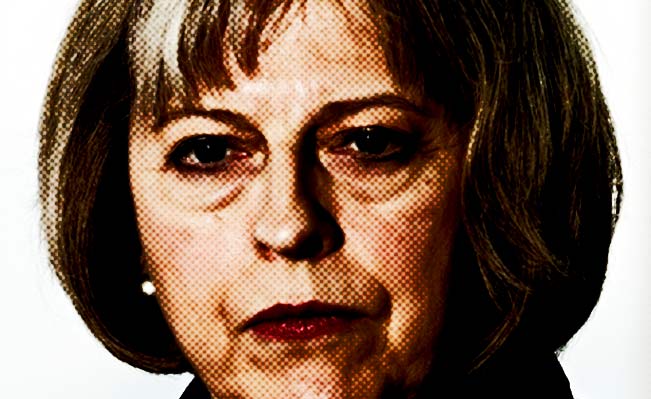
Attacked for their faith, their dress, their schools, their university societies and their politics, UK Muslims are scapegoated on a daily basis
Let me make it clear: I am totally opposed to ISIS, to terrorism, and I would oppose anyone going to fight for them in Syria. I also oppose honour killings, FGM and forced marriages as – it should go without saying – barbaric practices.
But am I the only person horrified at the proposals from Home Secretary Theresa May in a speech this week which, if implemented, will lead to a even greater scapegoating of Muslims than at present, and probably also help fuel the Islamic extremism which she regards as the greatest threat?
How to respond to the growth in terrorism, the spread of ISIS in the Middle East, the alienation of some Muslim young people in Britain? It’s obvious when you think about it. Introduce mosque ‘closure orders’, appoint ‘extremism officers’ in prisons, investigate honour killings and FGM, create more banning orders on non-terrorist groups, and slash public money for translation services.
May’s speech was warmly received among politicians and media. Labour’s Yvette Cooper indeed complained that it didn’t go far enough.
There was barely a word of criticism. Yet are we really meant to accept that places of worship should be closed because there might be a small number of supposed extremists in them? If so, how do we define extremism? Should extreme Christian churches be closed, or synagogues or temples, if they too have worshippers who could be classed extreme?
What does it mean, in any case, to be an extremist? May suggests that it encompasses those who do not subscribe to ‘British values’. But what are those values, and do these bans extend to communists, socialists, anarchists, republicans, feminists, black nationalists and a wide variety of campaigners, including anti-war campaigners, who criticise the government?
May might be happy to lock all those people up and curtail their freedom, but they are not, at least at present, her main focus. Nor are the Christians who practice FGM or Hindus who carry out honour killings the target.
This is about the Muslims, who are finding that they cannot do anything right in the present political climate here in Britain. Attacked for their faith, their dress, their schools, their university societies and their politics, they are scapegoated on a daily basis. Stories detrimental to Muslims are daily front-page fodder for the media. Stories which are favourable to them, or which highlight inaccuracies in previous reports, are largely ignored.
Take two examples. A parliamentary committee found that the allegations of Islamic extremism in Birmingham schools made during the Trojan horse affair last year were virtually all false. This was barely reported. Indeed, Tory Home Secretary Theresa May repeated the lie in her speech on Islamic extremism only this week. Did no one inform the Home Secretary that this was an untruth, or was it more politically convenient than the facts?
Then there’s the case of the three Bethnal Green girls who went to Syria. It was alleged by the Turkish government that an intelligence officer from Canada helped them across the border from Turkey. It was only briefly and partially reported in mainstream media.
There is a daily bidding war, promoted by politicians and media, to ratchet up attacks on Muslims, to blame them for anything that goes wrong and to imply that their whole religion and philosophy is anti western and anti British.
It’s against the background of this relentless series of attacks on Muslims that May launched her speech. As with all policy proposals on terrorism since 2001, its confuses symptoms and causes. Terrorism is a much greater threat than it was 14 years ago, when the war to supposedly end it began.
Since then, a series of invasions, bombings and occupations of Middle East and south Asian countries, plus covert interventions in many more, have led to huge numbers of dead and displaced people, the wrecking of whole states, most notably Libya and Iraq, opposition from Muslims both in those areas and in the Western countries which have led these wars. Their opposition to foreign policy has been at best ignored – as it was when 2 million of us marched against the war in Iraq in 2003 – or become the subject of surveillance and attacks on civil liberties.
It is regarded as commonplace that students and young prisoners are both becoming ‘radicalised’. But there is no sense of understanding that this ‘radicalisation’ might be a perfectly rational response to injustices around the world, and that those who subscribe to these views are very far from being terrorists.
Even those who do decide to go to Syria may have all sorts of confused motives for doing so, and may be seeing their role as helping Syrians rather than supporting ISIS. Whatever the truth, is it really sensible to treat them as terrorists and impose draconian prison sentences on them?
In addition May wants to ‘promote British values’. And in a delightful nod to Nigel Farage, and his upset at hearing foreign languages spoken in public, there will be a sharp reduction in funding for translation services but a significant increase in money for English language training.
A bankrupt Tory party, incapable of winning a majority in the last election and now heading for the same fate in six weeks’ time, is taking refuge behind a rising tide of Islamophobia and racism.
May’s wish list is a combination of wilful ignorance, malice and extremely unpleasant racism, mixed in with a seemingly congenital inability from right wing politicians to even begin to understand the causes of terrorism in the world today.
Update
According to Metropolitan Police figures, Islamophobic attacks are rising dramatically. Figures for February 2015 show a 211% increase compared to February 2014.

